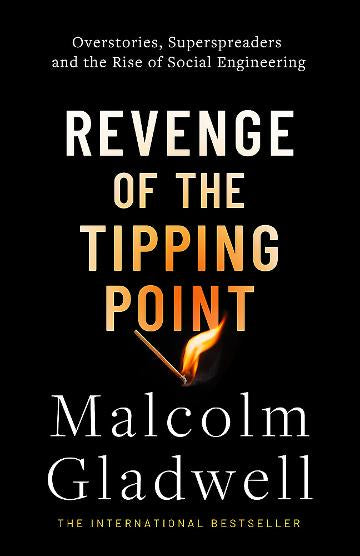Malcolm Gladwell
Revenge of the Tipping Point
Revenge of the Tipping Point
Couldn't load pickup availability
Nick Day's Review - Navigating the Nexus of Influence: Insights from Malcolm Gladwell and Yuval Noah Harari
Reading Malcolm Gladwell’s The Tipping Point and Yuval Noah Harari's Nexus together offer a deep understanding of how ideas and behaviours spread, and the powerful role narratives play in human societies. Gladwell's exploration of how homogeneous populations are susceptible to social epidemics complements Harari's analysis of the power of stories and information systems in shaping human values and practices. Harari uses the example of Facebook's role in the Rohingya genocide to highlight the dangers of Artificial Intelligence (AI) in information systems and how algorithms can exacerbate harmful behaviours. He argues that the design and operation of AI information networks can predispose AI itself to run out of control. However, integrating Gladwell's insights, it becomes clear that the real unappreciated consequence in Myanmar was Facebook’s underestimation of its potential influence on such a vulnerable and homogeneous population. The lack of diverse perspectives in Myanmar’s mainly Buddhist community - suffering from decades of racist commentary and propaganda - made it easier for harmful narratives to spread quickly and unchecked in the Facebook echo-chamber, leading to catastrophic consequences.
Gladwell also outlines how ideas and behaviours spread through overstories and superspreaders. An overstory - a collective consciousness that shapes behaviour - can endure for decades. In Harari's case study on Myanmar, the overstory is the widespread dissemination of hate speech against the Rohingya, amplified by Facebook's algorithms, creating an echo chamber effect. Facebook, acting as a superspreader, significantly influenced the effect of harmful narratives due to its vast reach and lack of content moderation/self-correcting mechanisms, contributing to ethnic violence and genocide. This example underscores the importance of responsible management and moderation of content on influential platforms.
The interplay between homogeneous populations and the spread of ideas, as explored by Gladwell, coupled with Harari's examination of the power and pitfalls of AI-driven information networks, offer a powerful lens through which to view recent events like those in Myanmar. The danger of algorithms and echo chambers exacerbating harmful behaviours, alerts us to the crucial importance of designing and managing technology with a deep understanding of its potential social impacts. Ensuring diverse perspectives, self-correcting mechanisms, and preventing the unchecked spread of harmful narratives, are critical to avoiding negative outcomes. Together, the perspectives of these two books underscore the complexities and ethical challenges posed by modern information systems in this new age of AI.
Publisher’s Review
Twenty-five years after the publication of his groundbreaking first book, Malcolm Gladwell returns with a brand new volume that reframes the lessons of The Tipping Point in a startling and revealing light.
Why in the late 1980s and early '90s did Los Angeles become the bank robbery capital of the world? What is the magic third and what does it have to do with racial equity? What do big cats and clusters of teen suicide have in common? These are just some of the questions Malcolm Gladwell addresses in this new work, which revisits the phenomenon of epidemics and examines when, how, and above all where ideas, viruses, and trends spread.
Gladwell shows that - whether in neighbourhoods, schools, zoos, or conference rooms - today's epidemics are no longer singular occurrences, but turbocharged versions of their earlier counterparts. Tipping points, he explains, play a much bigger role in our lives now than ever before. With this provocative and fascinating new book, we can meet them in novel and innovative ways.
Share


